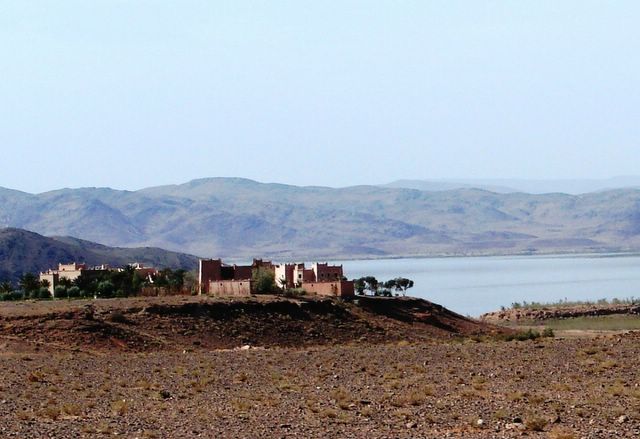The Hilly Side of Freedom
When the sun peaked over the horizon of enlightenment, two wise men were vigorously debating the state of humanity, natural law, and the role of authority in addressing man's intentions and natural characteristics. They advanced two opposing views that helped shape the course of enlightenment and provided the impetus for the intellectual revolution that rippled through the West from the 17th century on. One John Locke preached an optimistic view of humanity for he sees man as being governed ‘according to reason’, hence, capable of coexisting with his fellow man peacefully. Thomas Hobbes on the other hand, was rather pessimistic and cynical for he sees man to be solitary and self-interested, hence, living in a perpetual ‘state of war’ with his fellow man. Both, however, agreed that all men are equal in nature. But as Hobbes believed that the equality of men exists in a ‘state of war’ where even ‘the weakest has strength enough to kill the strongest’, Locke believed that the equality of men resides in the idea that all men are naturally in a state of ‘perfect freedom’, ‘equality’, and ‘liberty’. In other words, if Hobbes believed that natural law is a constant ‘state of war’, Locke believed it to be humanity’s state of equality and freedom.
Today, the debate between Hobbes and Locke remains largely unresolved. I suspect that it is because there is much of both Hobbes and Locke in humanity. The advance of human liberty, indeed, presupposes that the natural state of humanity is one of equality and freedom. But, is the drive to free man, in itself, not a struggle to rid humanity of the natural characteristic of man to be ‘selfish’, ‘nasty’, ‘brutish’, and ‘evil’? Is the role of government not to both preserve (Locke’s view) and control (Hobbes’ view) natural law for and against man? If so, then, both Hobbes and Locke have, indeed, argued two opposite sides of the same coin, whereby when Hobbes prevails entirely, one witnesses tyranny and when Locke prevails entirely, one risks anarchy.
The idea of freedom would be straight forward if it were not for mankind. Throughout history and into modern times, the world has witnessed many struggles against pronounced forms of tyrannical and evil authority. But history shows that man’s struggle for freedom does not end with the demise of any one oppressive force. In the last century alone, we have seen Europe fight the evils of Nazism all while millions in Africa fought against the injustice of European colonialism. We have seen the United States fight the oppressive forces of communism all while Black Americans marched to claim their own freedom from the evils of racism. At times, the words of Thomas Hobbes come into a life of their own as man stretches his cruelty over his fellow man. Yet, the inspiring words of John Locke sustain our hope for an endgame where a global state of freedom, equality, and good governance is attained. It is after all the same hope that led Francis Fukuyama to predict the ‘end of history’ following the demise of the Soviet Union. It is the same hope that is now driving the arguments advanced by the American presidency as it seeks to promote democracy in the Middle East.
The world’s most powerful nation on earth says that it is now at the service of the oppressed and at the helm of the free world. In speaking on behalf of man’s inherent desire to live in freedom, President Bush often projects the optimism of John Locke. But when he expresses his cynicism of the international community, he in effect sides with Thomas Hobbes. This is in itself an illustration of how man has come to believe but hardly trust. The belief in man’s predisposition to be good comes from a hopeful vision for the future, whereas mistrust and cynicism of human nature is rooted in the painful reminder that is our past. This is the all-too-familiar debate between painful realism and hopeful optimism.
The president’s impassioned speech about the promotion of democracy and freedom in the Middle East is necessary. It serves as a catalyst for change and renewed confidence in the forces of reform and democracy in the region. But it is ultimately up to the people of the Middle East to rise against the forces of tyranny in their midst and break with a past in which Thomas Hobbes was mostly right and into a future where John Locke is more discernible. The Middle East needs its own intellectual revolution whereby questions of freedom, natural law, and the role of government are debated in the tradition of enlightenment.
Every revolution needs an enabling force, a trigger, and a control mechanism. The U.S. by virtue of its leadership position can provide the trigger and assist with a control mechanism. But, it can not insert itself in place of the people as an enabling force for change in the region. As such, American policy must be directed to empower the people of the Middle East and shun the temptation to obsess over short-term interest. It is encouraging to observe that the U.S. is now willing, although hesitantly, to nudge its allies Egypt and Saudi Arabia into reform. It is way overdue that tyrants be placed under international siege for their internal strength is indeed overrated and their rule unsustainable. In a world far more interdependent and interconnected than that of Hobbes and Locke, the future should be far more hopeful than it used to be.
See Also Previous Posts:
.


























5 Comments:
I see the issue as a bit more complicated than a simple dichotomy of tyranny vs. freedom. Each individual is capable of making choices, but those choices are not always black-and-white. Many times people choose tyranny, while believing that what they choose will bring, ultimately, liberation.
March 14, 2005
I'll give you a few examples that actually confirm the simple dichotomy of tyranny vs. freedom: Ghandi, Martin Luther King, Aung sun Sukhi (still not free), Nelson Mandela, Dalai Lama (physically free but not his people).
However, in most cases it is not that simple and that's actually the point of my article. That just taking Locke's approach alone or Hobbes' approach alone to freedom is not enough. That the issue is more complicated and requires renewed intellectual study. Otherwise we are locked in either the disappointments of the past or the fantasies of tomorrow.
The most important point I try to communicate is that man is the sole custodian of his own freedom and that real positive change comes from intellectual revival not physical confrontation.
March 14, 2005
I wonder what determines whether we choose tyranny or freedom...
March 15, 2005
One of those brilliant women whose voices are hardly noticed today, Rose Wilder Lane, wrote an interesting book in the late 1930s addressing exactly your question. The book is called: "The Discovery of Freedom: Man's Struggle Against Authority". It's one of those books that you are lucky to find in those old-fashioned book shops (my favorites!) but I suspect you can also get it through the internet. I highly recommend it.
I think Ms. Wilder would agree that history is full of examples where people would struggle to free themselves only to turn around and fall to tyranny all over again. However, there is something different to the times we live today. We are highly interconnected and increasingly interdependent. Proof is that we are right now communicating ideas through this wonderful medium and making the concept of distance, nationality, borders, and social class almost irrelevant. So, we are becoming more aware of each other and more keen to feed of each other's experiences even when we express the most vehement disagreements with each other. People in general want to be free: free to dream, free to think, free to hope, and free to live. They, however, sometimes let emotions like fear and hate take ownership of their intellectual capacity. They allow their weaknesses and vulnerabilities to be exploited by tyrants, hoping for security, revenge, etc., but all they really get is a lifetime of suffering.
A relevant quote would be one by Benjamin Franklin who wrote: “They that can give up essential liberty to obtain a little temporary safety deserve neither liberty nor safety”
March 16, 2005
I really enjoyed that last quote by Franklin.
It strikes me that President Bush would argue the exact opposite. The homeland security act calls for a temporary removal of freedom for security.
Why do we forsake the great advice our forefathers left us?
March 25, 2005
Post a Comment
<< Home